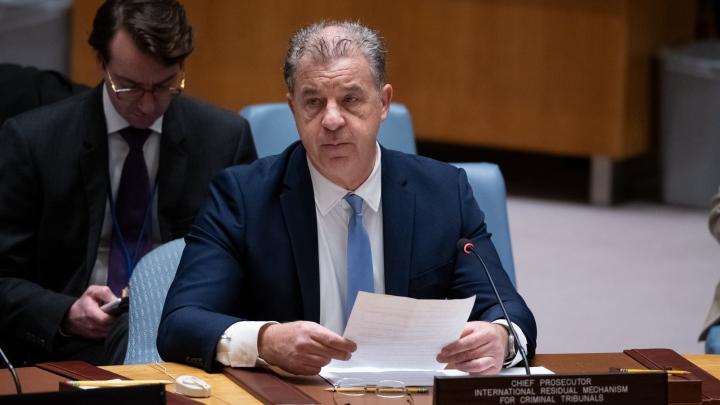Prosecutor Serge Brammertz Addresses the United Nations Security Council

Serge Brammertz, Prosecutor of the International Residual Mechanism for Criminal Tribunals (Mechanism), today addressed the United Nations Security Council about the work of the Office of the Prosecutor (OTP).
Prosecutor Brammertz began by informing the Council that the OTP has completed its important mandate to prosecute the final ICTR and ICTY cases.
He noted that the judgment of the Appeals Chamber in the Stanišić and Simatović case, issued on 23 May 2023, in which the Appeals Chamber accepted the OTP’s arguments that Stanišić and Simatović are criminally liable as participants in a joint criminal enterprise to ethnically cleanse large areas of Croatia and Bosnia and Herzegovina. Reflecting on the cases prosecuted for crimes committed in the former Yugoslavia, Prosecutor Brammertz underlined that those most responsible were “senior officials at the apex of power who incited hatred and fear, who unleashed unspeakable violence, to achieve their political goals.” He further emphasized the key lesson: “It’s not Serbs, Croats or Bosniaks who are guilty. Rather, the crimes were the work of individuals. It is these individuals, from all ethnic groups, who we have prosecuted and convicted.”
In relation to the effective end of the Kabuga case, Prosecutor Brammertz said, “My Office, and all those who believe in justice, can only feel immense dissatisfaction,” recognizing that “the victims and survivors of Kabuga’s crimes did not receive the justice they deserve.” He noted though that while Kabuga will not be held accountable, “it is within our power to ensure other criminals do, particularly those who continue hiding within diaspora communities around the world.” In this regard, Prosecutor Brammertz informed the Security Council that on 14 November 2023, the OTP announced it conclusion that the fugitive Aloys Ndimbati is deceased, and that the OTP anticipates it will account for the final two ICTR fugitives – Ryandikayo and Sikubwabo – in 2024.
Turning to the future, Prosecutor Brammertz briefed the Security Council on the OTP’s vital work providing assistance to national authorities investigating and prosecuting in domestic courts those who committed crimes during the 1994 Genocide against the Tutsi in Rwanda and the conflicts in the former Yugoslavia. Prosecutor Brammertz explained that executing this mandate will be the OTP’s focus moving forward, and that this work is how the OTP realizes “the Security Council’s vision that national courts fully take over responsibility from the ICTR and ICTY.”
He noted that for the last several years, the OTP has been responding to more than 300 requests for assistance annually. He also noted that national prosecutors in Rwanda and the countries of the former Yugoslavia have repeatedly emphasized that continued assistance from the OTP is critical to enable them to achieve more justice for more victims and survivors.
Prosecutor Brammertz outlined the three major areas in which the OTP provides support upon request. First, the OTP provides access to evidence and information contained within its evidence collection, which totals more than 11 million pages and thousands of hours of audio- visual material. Second, utilizing its developed expertise, the OTP provides assistance across a broad range of legal, evidentiary, prosecutorial and strategic matters, including by preparing investigative dossiers for national prosecutors concerning priority accountability gaps related to ICTR, ICTY and Mechanism cases. Third, the OTP offers expert support upon request to national prosecutors concerning fugitives from justice in Rwanda and the countries of the former Yugoslavia.
In conclusion, Prosecutor Brammertz recalled that December 9th was the 75th anniversary of the adoption of the Genocide Convention. Noting that the ad hoc tribunals had successfully punished perpetrators of genocide crimes committed in Rwanda and the former Yugoslavia, he emphasized, “There is no expiration date for the international community’s obligation to prosecute genocide crimes. While international trials for the crimes in Rwanda and the former Yugoslavia have now concluded, national prosecutors are continuing our work in their courts.” Prosecutor Brammertz further explained that in addition to the support the OTP’s provides, “every Member State has the responsibility and opportunity to play their part by providing full cooperation and effective support.” He also brought attention to the issue of genocide denial, commenting, “We must also recognize that denial is the last resort of genocide ideology. Denial seeks to erase both the victims and the crimes. So as much as we must continue to seek out and punish the perpetrators, it also falls to us to ensure that the truth is defended and promoted.”